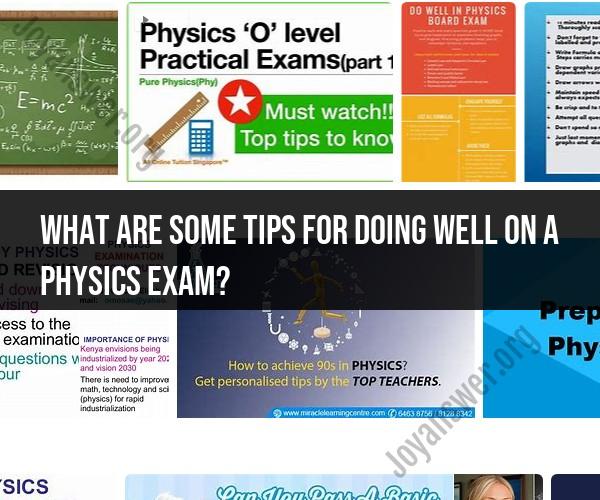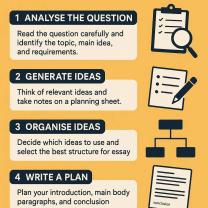What are some tips for doing well on a physics exam?
Acing your physics exam requires effective preparation and strategic test-taking techniques. Here are some tips and strategies to help you do well on your physics exam:
Before the Exam:
Understand the Format: Familiarize yourself with the exam format. Know the types of questions (multiple-choice, short answer, calculations) and the allocation of marks for each section.
Review Class Notes: Go through your class notes and textbooks to ensure you understand the key concepts and equations covered in the course. Pay special attention to any topics your instructor emphasized.
Practice Problems: Solve a variety of practice problems to reinforce your understanding of concepts and improve problem-solving skills. Use your textbook, class materials, and additional resources as needed.
Study Groups: Join or form study groups with classmates. Explaining concepts to others can reinforce your own understanding, and you can learn from their insights.
Use Online Resources: Utilize online resources, such as educational websites, physics forums, and video tutorials, to clarify difficult topics or get different perspectives on concepts.
Review Past Exams: If previous exams are available, review them to get a sense of the question style and the topics that are frequently covered.
During the Exam:
Read Instructions Carefully: Take a moment to read all instructions and question prompts carefully. Ensure you understand what is being asked before attempting to answer.
Budget Your Time: Allocate your time wisely based on the number of questions and their point values. Don't spend too much time on a single question; move on if you're stuck and come back later if needed.
Answer Every Question: In most cases, it's better to provide an educated guess rather than leaving a question blank. Many exams do not penalize for incorrect answers, so make an educated guess if you're unsure.
Show Your Work: For calculation-based questions, show your work step by step. Even if you make an error in your calculations, you may receive partial credit for correctly applied concepts.
Use Units: Always include units when presenting numerical answers. Pay attention to unit conversions if the exam involves different units.
Use Symbols and Equations: If you have trouble remembering a specific equation or constant, write down relevant symbols or equations early in the exam to reference later.
Check for Mistakes: If time permits, review your answers and calculations for errors. Double-check your work to catch any potential mistakes.
After the Exam:
Reflect on Mistakes: After the exam, analyze any mistakes you made. Understand why you got them wrong and how you can avoid similar errors in the future.
Seek Clarification: If there are concepts or questions you didn't understand on the exam, seek clarification from your instructor or a tutor.
Keep Learning: Physics is cumulative, so continue building on your knowledge for future exams and coursework.
Stay Positive: Maintain a positive attitude throughout the exam. Confidence and a calm mindset can help you perform at your best.
Remember that success in physics exams often requires consistent practice and understanding of the underlying principles. Don't cram at the last minute; instead, aim for steady and thorough preparation throughout the course. If you encounter challenges, don't hesitate to seek help from your teacher or academic resources.












